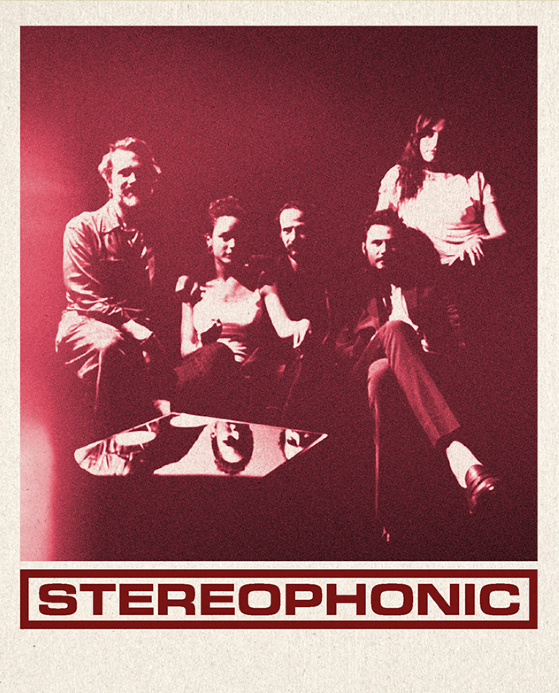Following its extended Off-Broadway run at Playwrights Horizons earlier this season in October-December of 2023, the highly acclaimed Stereophonic, with a book by David Adjmi and original music by Will Butler (of the indie rock band Arcade Fire), has transferred to Broadway for a limited engagement at the Golden Theatre. The documentary-style play with music follows the recording of a new album by a rising 1970s rock band over the period of what should have been six months but expands into a long and difficult two years of internal conflicts, during which time the group attains superstar status as their previous record reaches the top of the charts, while their personal relationships steadily decline.
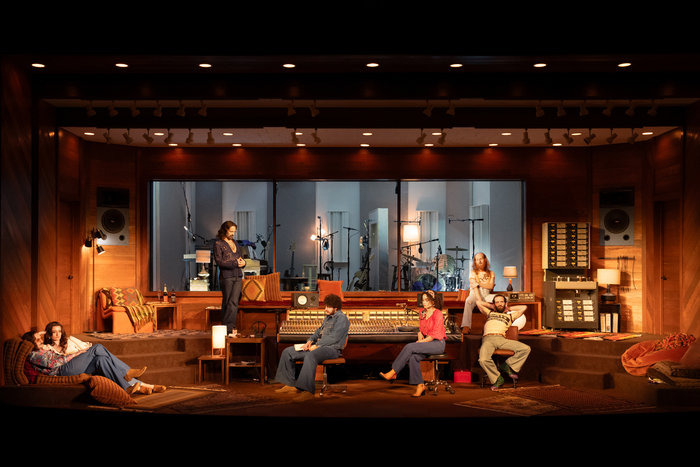
Set in the years 1976-77, first in a recording studio in Sausalito, California, and then in another in LA, the four-act narrative of the unnamed fictional band – consisting of its three original British members (spouses Reg and Holly, and Simon, whose wife and children remained in England) and two Americans (the unmarried coupled Diana and Peter, who also serves as the album’s producer) – bears a striking resemblance to, and was clearly inspired by, the real-life story of the British-American rock band Fleetwood Mac and their turbulent breakups during the making of their 1977 album Rumours in Sausalito. Here the band is joined in their increasingly explosive late-night studio sessions by engineers Grover, who lied about his credentials to land the job, and Charlie, who is largely ignored by the group and generally goes unnamed, since they don’t have a clue what his name is.
In keeping with the era and the rock-star archetype, we see them all over-indulging in alcohol, cigarettes, pot, and cocaine, which only serve to ignite their incendiary confrontations about the recording and its songs, and their heated interactions over their deteriorating love and camaraderie. We are privy, as if eavesdroppers or flies on the wall, to their talking simultaneously, casual conversations about everything from their sexual encounters to movie favorites, and their serious revelations about their greatest anxieties, philosophies of life and art, and the issues in their shattering partnerships, both personal and professional.
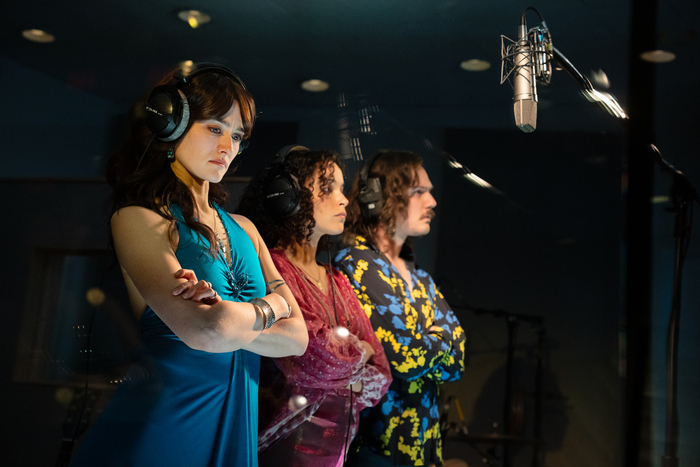
Under the direction of Daniel Aukin, a terrific multi-talented cast of seven captures the at-odds personalities, their egos and insecurities, with raw emotion and psychological insight, teasing humor and expressive connections that devolve into intense anger. They also deliver the evolving songs with vocal and musical mastery, from the first snippets through the many track layers, countless retakes, and mixing of the recording to the final full-length locked numbers and finished album (with sound by Ryan Rumery and orchestrations by Butler and Justin Craig, who also serves as music director), with which they’re all ultimately pleased (if not with each other). While the show, at more than three hours, feels long and sometimes redundant, it gives us a feel for the lengthy process, recurrent disagreements, and pressures of creating, compounded by the struggles of deteriorating love and friendship among the intimate group.
Tom Pecinka portrays the tactless and volatile, ambitious, profit- and perfection-driven Peter, his total lack of social skills and unabated bullying of his bandmates, engineers, and girlfriend Diana. Sarah Pidgeon’s compelling characterization of Diana embodies her struggles with nerves and self-doubt, stage fright and the imposter syndrome, despite her supreme talent and growing success, until she resolves to leave Peter, finally blows up at him and his incessant criticism in the studio, delivers a blockbuster vocal on her disputed song, and shares the news that she’s been offered a solo album.
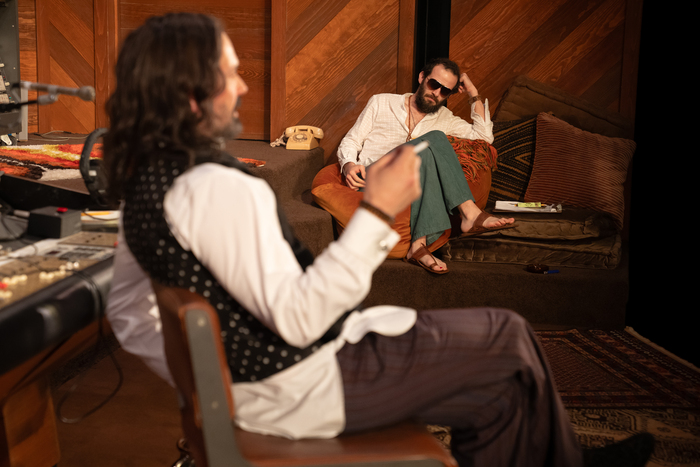
Will Brill’s depressed and neurotic Reg, who spends much of his time drinking and hiding under a blanket, sees his marriage dissolving but modifies his behavior after his wife Holly becomes tired of cleaning up after him and his vomit, and tells him it’s over. Played with strength by Juliana Canfield, Holly moves out of the house they all share during the seemingly interminable recording sessions and battles, and is a good friend to Diana, who follows her. But will it last, or degenerate, with a sideways glance and raised eyebrow, into the hostility and competitiveness that plague the group?
In the role of Simon, Chris Stack is quietly devastated upon hearing that his wife back in England is divorcing him, misses the hopeful and cohesive times when the start-up band was just the three Brits, tries to lessen the animosity of the others with a more controlled approach that doesn’t often work, and intervening when Peter’s attack on Grover becomes physical. Eli Gelb as the diplomatic Grover expresses his exasperation and hatred of the egomaniacal rock stars and the nightmare the recording has become to fellow techie Charlie – infused by Andrew R. Butler with comical starstruck deference and funny chats with Grover about getting high and sex – listening in with him on their private exchanges with the flip of a switch, hearing the band’s stormy off-stage outbursts, and putting in the requisite hours and technical knowledge, with them and alone, to make the album another hit, creating something they can all be proud of, and advancing his own career in the industry.
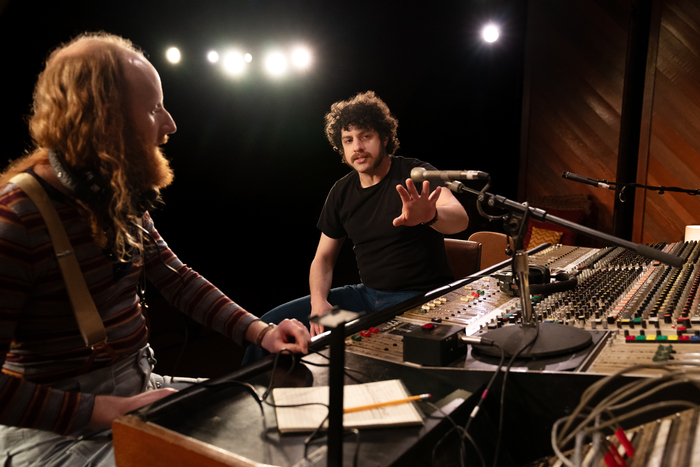
The engaging and believable ensemble cast is supported by a period-style design, with an authentic set by David Zinn that includes real music recording equipment in a bi-level studio, costumes by Enver Chakartash, and hair and wigs Robert Pickens & Katie Gell, that recreate the look of the ‘70s, with bell bottoms, bright patterns, platform shoes, and lots of hair, and lighting by Jiyoun Chang that signals the times of day, passing hours, and shifts from scene to scene.
Stereophonic gives theatergoers an inside look at what it takes to make a successful rock album and how difficult it is to maintain a solid relationship amidst the pressures, especially when exacerbated by substance abuse, over-the-top egos, and a total lack of anger management, in a show that’s both entertaining and enlightening.
Running Time: Approximately three hours and 10 minutes, including an intermission.
Stereophonic plays through Monday, July 7, 2024, at the Golden Theatre, 252 West 45th Street, NYC. For tickets (priced at $48-269, including fees), go online.


